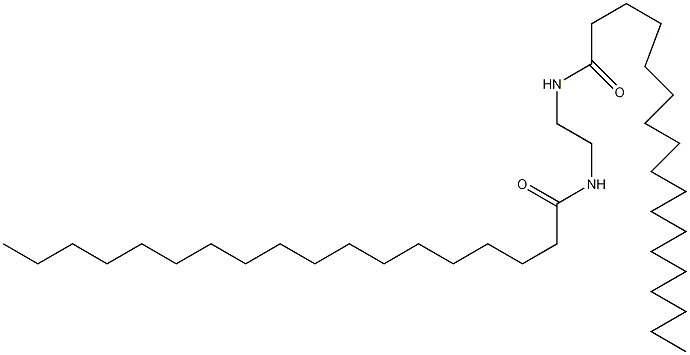
Structural formula
| Business number | 030Y |
|---|---|
| Molecular formula | C38H76N2O2 |
| Molecular weight | 593.04 |
| label |
1,2-Ethylenebisstearamide, Ethylene bis stearamide, Distearylethylenediamine, 1,2-ethylidene double stearamide, N, N’-ethylene bistearic amide, N,N’-Ethylenebisstearamide, lubricants, Release agent |
Numbering system
CAS number:110-30-5
MDL number:MFCD00059224
EINECS number:203-755-6
RTECS number:None
BRN number:None
PubChem number:24867205
Physical property data
1. Properties: white to light yellow powder or granular matter.
2. Density (g/mL, 25℃): 0.98
3. Relative vapor density (g/mL, air=1): Undetermined
4. Melting point (ºC): 142~144
5. Boiling point (ºC, normal pressure): Undetermined
6. Boiling point (ºC, kPa): Undetermined
p>
7. Refractive index: Undetermined
8. Flash point (ºC): 285
9. Specific rotation (º): Undetermined
10. Autoignition point or ignition temperature (ºC): Undetermined
11. Vapor pressure (mmHg, 25ºC): Undetermined
12. Saturated vapor pressure (kPa , ºC): Undetermined
13. Heat of combustion (KJ/mol): Undetermined
14. Critical temperature (ºC): Undetermined
15 . Critical pressure (KPa): Undetermined
16. Log value of oil-water (octanol/water) distribution coefficient: Undetermined
17. Explosion upper limit (%, V/V ): Undetermined
18. Lower explosion limit (%, V/V): Undetermined
19. Solubility: Insoluble in water, ethanol, benzene, carbon tetrachloride, Solvents such as glycerol are soluble in mixed xylenes, terpenes, butanol, methyl cellosolve and other high boiling point solvents and hot chlorinated hydrocarbons and aromatic hydrocarbon solvents at temperatures above the melting point. Separate precipitates or colloids.
Toxicological data
None yet
Ecological data
Molecular structure data
1. Molar refractive index: 185.34
2. Molar volume (cm3/mol): 667.6
3. Isotonic specific volume (90.2K ): 1610.0
4. Surface tension (dyne/cm): 33.8
5. Polarizability (10-24cm3): 73.47
Compute chemical data
1. Reference value for hydrophobic parameter calculation (XlogP): 15.7
2. Number of hydrogen bond donors: 2
3. Number of hydrogen bond acceptors: 2
4. Number of rotatable chemical bonds: 35
5. Number of tautomers: 3
6. Topological molecule polar surface area 58.2
7. Number of heavy atoms: 42
8. Surface charge: 0
9. Complexity: 503
10. Number of isotope atoms: 0
11. Determine the number of atomic stereocenters: 0
12. Uncertain number of atomic stereocenters: 0
13. Determine the number of chemical bond stereocenters: 0
14. Number of uncertain chemical bond stereocenters: 0
15. Number of covalent bond units: 1
Properties and stability
Stable to acids, alkalis and media.
Storage method
Paper bag packaging. Store in a cool, dry place. This product is toxic, so precautions should be taken when handling it.
Synthesis method
1. Obtained from the reaction of stearic acid and ethylenediamine.

2. Dissolve 1 mol of stearin The acid is put into the reaction kettle and heated to melt. Continue to raise the temperature while stirring, and start adding ethylenediamine when the temperature reaches about 140°C. The amount added is equivalent to 1.5 times the mass fraction of stearic acid. The generated by-product water and low boiling point substances are separated through the water separator, and the reaction temperature is maintained at 140-160°C. When the separated water no longer contains ethylenediamine, the reaction is terminated, and the material is discharged while it is hot. After molding, it is cooled and packaged. .

3. Add the measured ethylenediamine and antioxidant into the ethylenediamine metering tank, and then put a certain amount of stearic acid into the reaction kettle. Replace the air in the reaction kettle with N2 three times, then add ethylenediamine, and heat the oil bath in the jacket of the reaction kettle. When the stearic acid is completely melted, start stirring and continue to heat up under the protection of nitrogen flow. Control the heating rate. When the temperature reaches 120°C, react at a constant temperature for 2 hours. Then add the catalyst to continue heating and control the heating rate. When the temperature reaches 180°C, keep the temperature constant for 3 hours. ~4h. Determine the acid value of the product. If the acid value does not reach <10 mgKOH/g, add a catalyst and raise the temperature to 200°C until the acid value is qualified. Then it is cooled to 160°C, quickly discharged, formed into flakes, and then crushed into products. The synthesis reaction formula is as follows:
The process control parameters are: the molar ratio of stearic acid to ethylenediamine is 1.7:1; composite antioxidant A+B is used, and the added amount is stearic acid input 0.03% of the amount; and protected by N2, kept at 120°C for 2 hours, then heated to 180°C at a rate of 1°C per minute, and kept at 180°C for condensation for 4 hours. The acid value of the product is ≤5mgKOH/g, the whiteness value is <5, and the melting point is 140~145℃.
Purpose
1. This product is used as a lubricant for plastics, has good internal and external lubrication, and can be used as a release agent. Mainly used in polyvinyl chloride, polyethylene, polypropylene, polystyrene, ABS, phenolic, and amino resins. The dosage is 0.2 to 2 parts per 100 parts of resin.
2. Adding this product to adhesives and waxes has the effect of preventing caking and good demoulding properties.
3. Adding this product to paint and rubber can improve the surface gloss of baking paint and rubber products.
4. Natural adhesives such as starch can be modified. Mainly used as lubricant or release agent for polyvinyl chloride, polyethylene, polypropylene, polystyrene, ABS, phenolic and amino resin, with good internal and external lubrication. The dosage is 0.2 to 2 parts per 100 parts of resin.
5. It has excellent lubrication performance, strong calcium salt resistance, and good drag reduction effect. It can be used for drilling in saturated salt water to reduce power consumption.

 微信扫一扫打赏
微信扫一扫打赏

